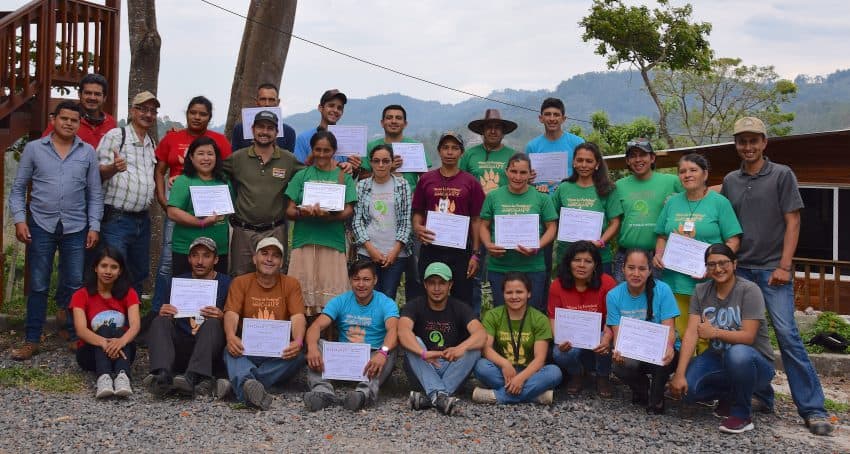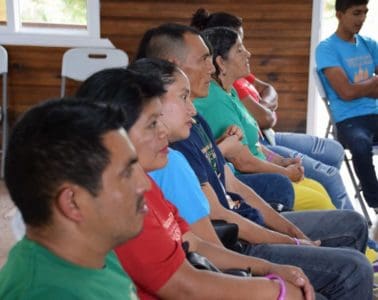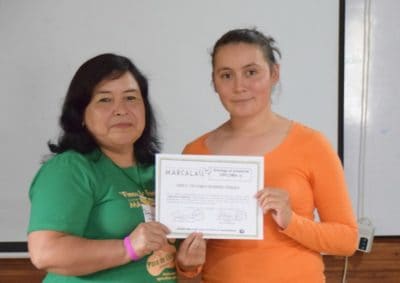COMSA: Developing the Potential of Farmers in Marcala, Honduras

Founded in 2000 by 62 farmers who wanted to change how coffee was grown, Cafe Organico Marcala (COMSA) is now comprised of over 300 members, many of whom belong to the Lenca indigenous peoples, bringing traditional sustainable farming practices to the fore. Now internationally recognized as innovators in organic practices—from carbon sequestration, and coffee drying innovations, to the recycling of wastewater—they share their practices with farmers from across Latin America through workshops.
With the support of the Grow Ahead funder community, COMSA hosted eight women from the neighboring communities of Intibucá and La Paz at the 27th Organic Agriculture Diploma Workshop from April 30 to May 5, 2018.
"If we put everything into practice what we have learned, we will be taking care of the environment and we would have a better quality of life. I know that everything is possible, even if there are things that we do not know. The path to follow is interest, will, determination and work," said Deicy Victoria Romero Pineda about key takeaways from the workshop.
The Human Farm
What is unique about COMSA's approach is that it enables participants to rediscover the essentials of life through ecological farming practices, while also focusing on the development of human potential.
Rooted in Elías Sanchez's philosophy of La Finca Humana (The Human Farm), COMSA's workshops bring participants on a journey to cultivate an understanding of the importance of shifting how we think. In order to form a new society and a new way of doing things, we need to observe, think and reflect for ourselves. We need collaboration instead of competition.
COMSA talks about the 5 M’s: Material, Microorganisms, Minerals, living Molecules and grey matter – the human brain. The changes that need to happen are primarily in the human brain, which is why COMSA refers to organic agriculture as The Human Farm.
“First, we need to plant the seed in the human mind and then in the farm.”
Organic agriculture requires a change in attitude, not just a change in farming practices. Producers need to cultivate themselves and their intention to care for nature.
The Fair Trade Advantage
Using the fair trade premium, COMSA provides much needed income to local farmers and farm workers and provides funding for social impact projects in local communities including teachers' salaries and school supplies. The premium also finances the construction of school kitchens in support of the Merienda Escolar program that provides meals for school children.
Allowing small-scale farmers in the cooperative to own shares of the coffee production is a critical component of COMSA's philosophy of “the full transformation of people” and economic well-being of the farmers. Farmers are compensated directly for their exports, a practice that is not common in the coffee industry.
Cultivating a Regenerative Future
Supporting the transition of farmers and the move towards resilient and regenerative organic practices will require not only the continued financial support of individuals who buy organic and fair trade products, but also direct financial cooperation.
Businesses and individuals in the Global North who are committed to fair trade are rising to the occasion and providing solidarity funding to support the transition to regenerative organic agriculture in the Global South through Grow Ahead's campaigns.
There are 500 million small farms worldwide that provide up to 80% of food consumed in a large part of the developing world. The solidarity funding we are seeing in the fair trade networks is inspiring, but in order to transform agriculture globally, we need to build a movement. Will you join us in investing in the future of farming? Consider making a contribution to Grow Ahead's scholarships program.
There are excerpts in this article that have been translated from Spanish, lightly edited and condensed for clarity.